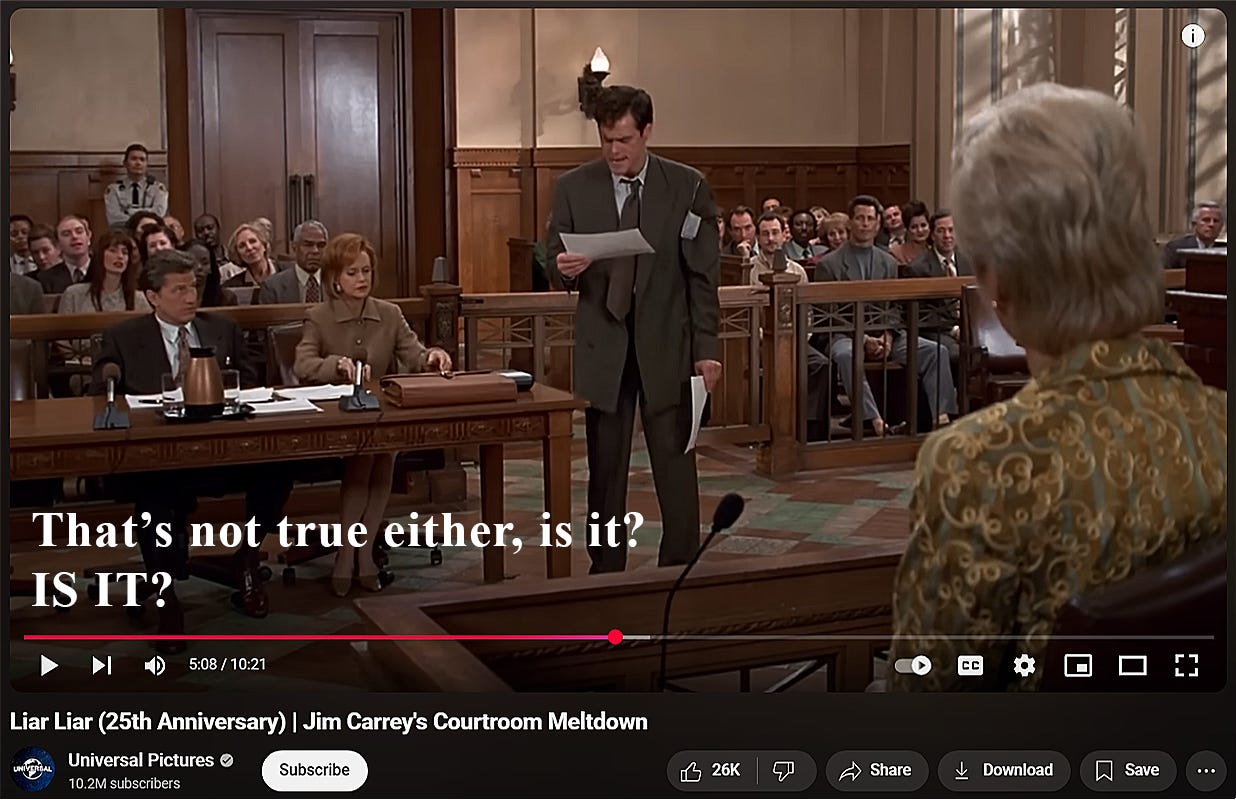Trade (Bet?) on... Everything
Kalshi’s audacious attempt to rebrand gambling as finance
Luana Lopes Lara, co-founder of Kalshi, recently appeared on Bloomberg TV. Originally from Rio, Brazil, she studied ballet before pursuing computer science and mathematics at MIT, where she also earned a Master of Engineering degree. In 2022, she was named to Forbes’ 30 under 30 list and became a viral sensation in Brazil.
Impressive credentials. Yet, when she was asked a fundamental question about prediction markets, her response fell flat:
Bloomberg TV: For some of us who are not as familiar with prediction markets, you said earlier, it’s not betting. Why is it not? Because it sort of looks and talks and walks a little bit like betting. What’s the difference between prediction market taking into account event contract, and betting?
LLL: The easiest way, I think to explain this is, we are pretty much like the New York Stock Exchange, or the Chicago Mercantile Exchange, in terms of structure. We are a trade matching engine, right? So you can come and say I want to take a position on this. Someone else says, I want to take a position on this. I think the big difference there is, we’re an exchange, we’re not a house. We don’t make money if people lose.
Whoever coached her for this conversation missed the mark, because her answer was fundamentally flawed and here’s why:
The determination of whether something constitutes gambling isn’t
based on the structure of a game or a market.
A simple definition of gambling is: games of chance and nonessential event contracts. If it’s a game, the law evaluates it on the skill-chance spectrum. If there is enough skill, it’s not gambling.
That considered, take poker for example. In 2012, a district court opined that poker involved enough skill that it wasn’t gambling, giving Lawrence DiCristina the right to continue running poker games out of a warehouse. However, the appeals court later overturned that decision. While opinions certainly differ on whether poker involves sufficient skill to not be gambling, the core issue remains: once poker is legally deemed gambling, removing the middleman doesn’t suddenly transform it into something else.
DiCristina himself tried to argue that his poker room wasn’t a gambling business, claiming that a game must be both house-banked and a game of chance to qualify:
[DiCristina] contends that the poker room he operated does not constitute a “gambling business” under this narrow definition—that is to say, that a game run by a “gambling business” must be both house-banked and predominated by chance in order to be sufficiently similar to those enumerated, and that his poker enterprise was neither.
The district court acknowledged poker wasn’t house-banked, stating in itsr 120-page opinion:
Unlike other games commonly considered gambling, such as roulette, craps, or blackjack, the house does not participate in game play during poker games. [citations omitted]
And:
Instead, players compete against each other, and money won or lost is merely transferred from one player to another. The casino provides a dealer, who does not play, and the casino makes money by taking a percentage of each pot, charging an hourly fee, or collecting a flat amount for every hand. The first of these is the most common; a “rake” (percentage extracted) of 5% to 10% is typical. [citations omitted]
Here’s the real question: Does being “house-banked” affect whether poker is gambling? The district court, unsurprisingly, concluded that it doesn’t, noting:
There is no evidence in the record that Congress considered whether a game was housebanked was a relevant characteristic in determining whether it constituted gambling under the IGBA. Neither dictionary nor common law definitions of gambling distinguish between games based on that factor. Nor does any federal gambling statute other than the IGRA rely on whether a game is house-banked to define its scope.
Honestly, that makes sense–removing the middleman doesn’t change the essence of gambling. It’s the substance that matters, not the form.
What about prediction markets though? Remember, Luana Lopes Lara’s argument was they are not the “house,” and they are not a counterparty to the trades. She was trying to distinguish Kalshi from bookies, implying that sports betting always involves a bookmaker.
Has Anyone Heard of Betfair? Betfair has been around for 25 years. In 2002, its founders received the EY Entrepreneur of the Year award, and their story was chronicled in You Bet: The Betfair Story: How Two Men Changed the World of Gambling.
The concept was simple-eliminate the middleman and allow bettors to place wagers directly against each other. Unlike traditional bookmakers, who risk substantial losses if their betting pool isn’t balanced–see Super Bowl XIII where practically every bet cashed in–Betfair functioned purely as a matching platform, facilitating trades without the inventory risk. The model allowed them to charge lower fees while still running a profitable business. Betfair is not accessible to us, but you can get some ideas (and charts) here.
The idea of removing intermediaries benefits consumers–unless the intermediaries add value, in which case the customers are willing to pay for their services. Betfair operated with lower margins, making it easier for bettors to find favorable odds. That’s precisely why the name was so fitting: Bet emphasized its gambling nature, while Fair highlighted its approach to better pricing.
Despite their innovation, no one ever claimed that Betfair was anything other than gambling. Yet, Kalshi is now attempting to rebrand a nearly identical concept as a financial market rather than a betting market, even though they are doing essentially the same thing–matching different bettors. If they were correct in their argument (spoiler: they’re not), then Flutter–the current parent company of Betfair–should be rolling out this model in the U.S. immediately.
Kalshi’s CEO, Tarek Mansour, shares an academic pedigree with his co-founder, Luana Lopes Lara. Born in California, and raised in Lebanon he studied at MIT and also landed on the Forbes’ 30 under 30 list in 2022. However, his statements on gambling are just as misleading as hers–whether out of ignorance, convenience or deliberate misrepresentation.
"I just don't really know what this has to do with gambling," he said at an office in Washington. "If we are gambling, then I think you're basically calling the entire financial market gambling."
He then doubled-down, regurgitating nearly the same flawed argument as Lara:
"In our markets, you're trading in an open financial marketplace. You're trading against other people," he added." If you go to a traditional model, you're betting against a sportsbook. They're setting the odds and they make money if you're losing money."
The audacity! Dustin Gouker, writer of The Closing Line was in disbelief:
The idea that Mansour that [sic] doesn’t “really know what his platform has to do with gambling” kind of defies belief. It’s a bit of gaslighting, but since Kalshi’s future hinges on people thinking and deciding it isn’t gambling, I get why Kalshi is going heavy with this kind of messaging.
A Pattern of Hypocrisy. The real problem isn’t just that Kalshi’s founders are wrong–it’s that they’re also being disingenuous.
While they insist their platform isn’t gambling, they have no issue advertising it as such. Earlier, we reported how they replaced “bet” with “trade” in their branding, but that wasn’t an isolated incident. Gouker meticulously documented several examples of this hypocrisy–excellent reporting that stood in stark contrast to journalists who merely accepted Kalshi’s claims without scrutiny.
Media take notice: If you’re interviewing Kalshi without first understanding Betfair’s history or failing to ask the hard questions, you’re not doing journalism—you’re enabling a national gambling operation.
The name Kalshi means “everything” in Arabic. Jason Trost, CEO of Smarkets, recently speculated on the Business of Betting podcast that Kalshi never intended to venture into sports event contracts; rather, it happened by accident. But the name choice seems to suggest otherwise, no? (We direct your attention to the 34:45 mark in his conversation with Wallach)
Perhaps their vision from the outset was to build a gambling exchange for everything and disguising it as a prediction market. Their approach seems to follow this pattern:
Introduce legitimate contracts that serve an economic function;
Push the boundaries with questionable contracts (such as election markets);
Once a legal precedent is set, lean even more into frivolous contracts; and
Despite repeatedly arguing they’re unlawful, eventually introduce sports markets.
It is becoming increasingly clear that the CFTC is not going to act, and Brian Quintenz, just yesterday, stated he has no plans to provide additional guidance anytime soon. If the recent state wins in Nevada and Maryland are any indication, Kalshi seems to have cracked a formula that’s working–at least for now.
But history has shown that regulatory winds can shift quickly. What looks like momentum today could turn into scrutiny tomorrow.
A wise man once said that greed always overplays its hand. Kalshi’s ambition to have everything by stretching, or outright ignoring statutory definitions may ultimately backfire–not just for them, but for the entire sports gambling industry.
Expect much more on this in the months and years. It’s going to be one heck of a ride.






